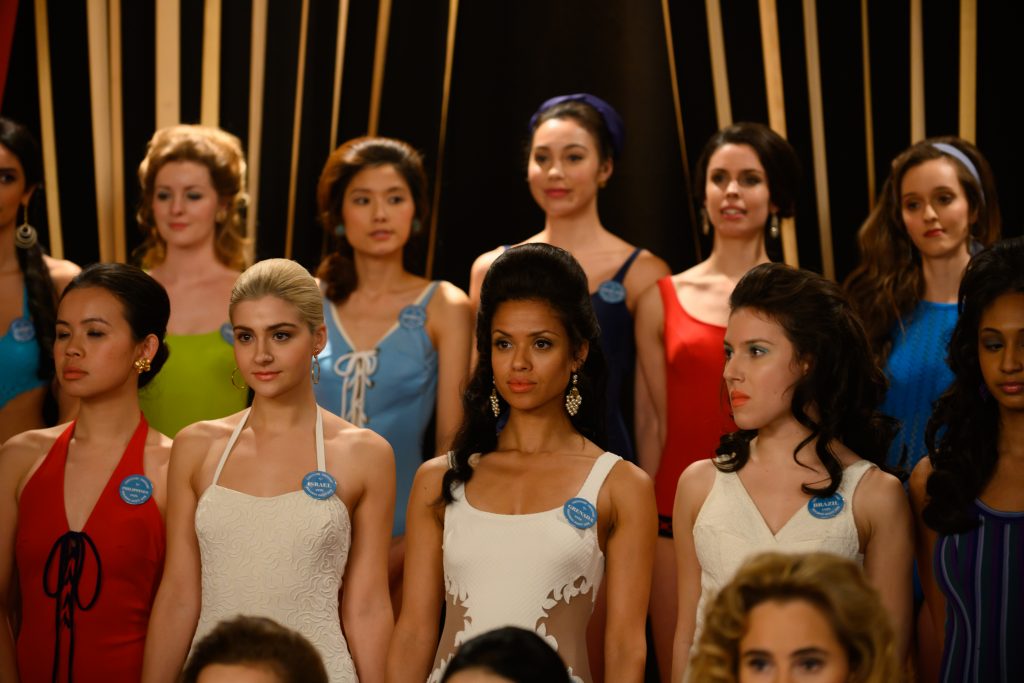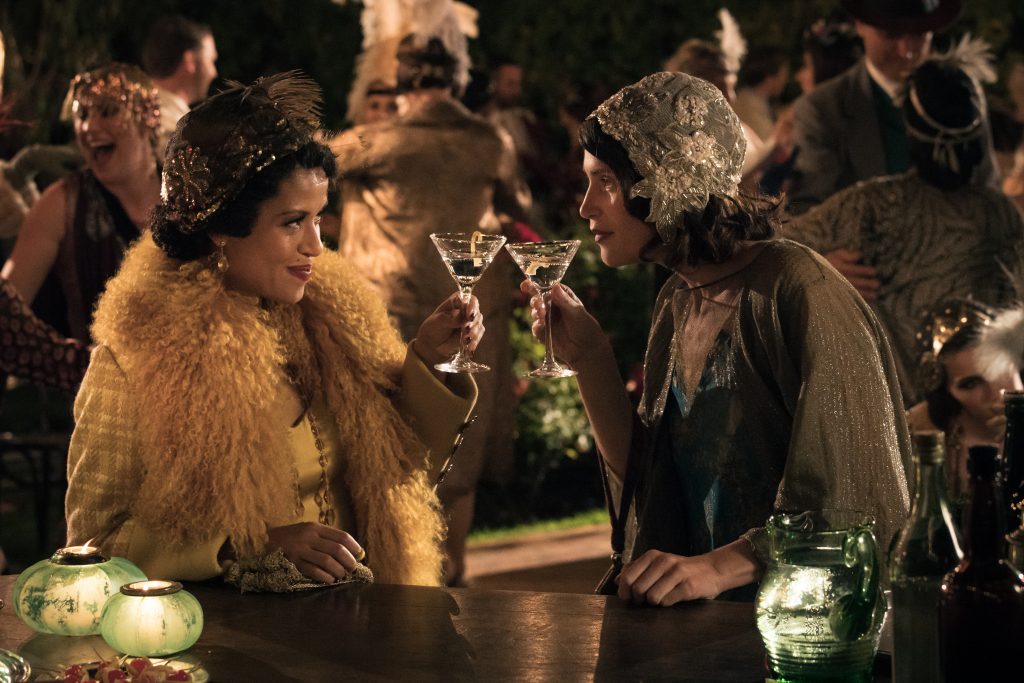September 30, 2020
by Carla Hay

Directed by Philippa Lowthorpe
Culture Representation: Taking place primarily in London in 1970, the dramatic film “Misbehaviour” features a predominantly white cast of characters (with some black people and Asians) representing the working-class, middle-class and wealthy.
Culture Clash: A group of young British feminists stage protests against the Miss World pageant for exploiting the female contestants.
Culture Audience: “Misbehaviour” will appeal primarily to people who are interested in movies about the feminist movement in the 1970s.

If misbehaving means disrupting and not always being polite, then activists will always be labeled as “misbehaving” by people who want to keep the status quo, even if the status quo is oppressing other people. The people who aren’t afraid to protest and “disrupt” are the heroes of “Misbehaviour,” which takes place in London in 1970, at the beginning of the decade’s women’s rights movement. “Misbehaviour” has many familiar hallmarks of movies that are based on true stories of people who fight against the system. However, the film rises above mediocrity, thanks in large part to well-paced direction and a very talented cast.
The main character of “Misbehaviour” is Sally Alexander (played by Keira Knightley), who evolves from being an introverted college student to a passionate leader of a protest movement. Although Sally’s perspective is the driving force of the movie, in many ways, “Misbehaviour” (directed by Philippa Lowthorpe) tells parallel stories of the lives of the feminists and the lives of women in the story who want more traditional lives for themselves.
In the beginning of “Misbehaviour” (written by Rebecca Frayn and Gaby Chiappe), Sally is nervously waiting at the University College London, where she is interviewed by an all-male panel of admissions administrators for a graduate program. Her interview is cleverly intercut with scenes of legendary comedian/actor Bob Hope (played with equal parts sleaze and style by Greg Kinnear) hosting an outdoor show for American and British military men in Vietnam.
As Sally lists her accomplishments to explain why she should be admitted into the university, the movie cuts back and forth to Hope introducing Miss World 1969, Eva Rueber-Staier of Austria (played by Kajsa Mohammar), to a leering and cheering audience of soldiers. While Sally hopes to be judged on her intelligence, Eva is paraded on stage as someone who is there just to be judged as a sex symbol to the audience. It’s a scene that has both contrasts and similarities.
Although Sally and Eva are both in their 20s, they both want different things in their lives. One woman has entered a competitive situation (college admissions) where her mind is valued, while the other has entered a competitive situation (a beauty pageant) where her body is valued. What these two scenarios have in common is that men are running the show, calling the shots and determining who gets to be rewarded.
Even during Sally’s interview, she is judged on her physical appearance, as two of the admissions officers scribble on their notepads and show each other what they think of Sally’s looks on a scale of one to 10. Who really knows if this happened in real life? The point is that even on a college admissions panel, a woman can be judged by how “appealing” she looks in ways that men are not judged.
In the college admissions interview, Sally is asked to give a summary of her life up until that point. She says that she left school at 15, but she ended up completing her undergraduate degree at Rustin College. She enrolled in drama school, only because her mother thought it sounded better than going to secretarial school. Sally says that she wasn’t very good at acting, partly because she dislikes it when people look at her.
Sally also tells the panel that she’s divorced with a 6-year-old daughter. Her marital and parenting status raises some eyebrows of the men on the panel. One of them comments to Sally, “You have a child, Ms. Alexander. Studying here is a big commitment.”
Sally then replies that she completed her undergraduate degree while her daughter was a baby. Sally adds, “The man I live with shares child care.” And that raises even more eyebrows with the men on the panel, since unmarried couples living together is considered taboo by many conservative people, especially in previous decades such as the 1970s.
Two months later, Sally is at home with her live-in boyfriend Gareth (played by John Heffernan); her daughter Abi (played by Maya Kelly); and Sally’s widowed mother Evelyn (played by Phyllis Logan). Sally thinks that she bombed in her University College London interview and expects to get bad news that the university has rejected her. Sally’s pessimism turns to enthusiasm when she gets a letter in the mail informing her that she has been admitted into the university, where she will be studying history.
Gareth is a very supportive boyfriend who does things like cook for the family. Evelyn, who has very traditional views of gender roles, thinks that it’s emasculating for Gareth to cook meals and shop for groceries. Many people might consider Gareth a “beta male” because he’s very happy to let other people, like Sally, be more dominant in his presence. Evelyn isn’t shy about telling her opinions to Sally, who often dismisses them as old-fashioned and sexist.
It’s hinted at but not stated outright that Sally was unhappy in her marriage because she felt oppressed by her ex-husband, who is not seen or heard in this movie. Whatever caused her feminist awakening, Sally is now appalled at beauty pageants that Evelyn and Abi like to watch on television. It bothers Sally so much that she will turn off the television if she’s in the same room while they’re watching a pageant. And she objects when Evelyn plays “pageant dress-up” with Abi.
Evelyn expresses dismay that Sally is against beauty pageants, which Sally feels are “degrading” and “sexist” events that exploit women and treat them as human cattle. Evelyn reminds Sally that Sally used to love watching pageants when Sally was a child. Sally responds by saying that she used to eat her own snot as a child too.
Meanwhile, a feminist from a working-class background is seen spray painting this slogan on a billboard: “Down With Penis Envy.” Her name is Jo Robinson (played by Jessie Buckley), and she’s seen doing this kind of graffiti mischief several times in the movie. In one scene, Sally catches her in the act and tells her to stop because some police officers are nearby.
Sure enough, the police see Sally and Jo and the graffiti and chase after them, but Sally and Jo are able to dodge them by hiding in an alley. (It’s a very stereotypical chase scene.) Sally and Jo get to talking and find out that they’re both feminists, but they have very different attitudes about achieving their feminist goals.
Sally is more about being organized and doing things by-the-book. Jo (who is a former art student) is more radical and prefers anarchist ways that would involve breaking the law. Jo tells Sally, “I don’t really do organized.” Sally tells Jo, “I don’t really do illegal.” When Jo invites Sally to her weekly feminist meeting that week, Jo politely declines because she says that she will be busy helping women who work as cleaning ladies to join a union.
But it should come as no surprise that Sally does eventually go to one of Jo’s meetings. They have ongoing disagreements, but they eventually find common ground and are able to work together for the same cause. Eventually, Sally, Jo and the other women in the group decide to stage protests against the 1970 Miss World Pageant.
“Misbehaviour” also takes a look at the major players behind this particular pageant. Married couple Eric Morley (played by Rhys Ifans) and Julia Morley (played by Keeley Hawes) are Brits who own the annual Miss World Pageant, which began in 1951, and by the early 1970s could attract a worldwide TV audience of more than 100 million people. (Eric died in 2000. Julia Morley is still head of the Miss World Pageant.)
The way the Morleys are portrayed in “Misbehaviour,” Eric is the forceful leader, while Julia is the opinionated follower. Eric is an egotistical TV host who isn’t shy about expressing his sexist views of women. He thinks that the contestants’ physical appearances are the only things that really matter in deciding who will win. And he openly makes crude comments about contestants’ body parts. Julia strongly believes that contestants’ personalities should have equal standing in how they are judged in the pageant.
There’s a subplot in the movie about Hollywood comedian/actor Bob Hope, who is portrayed as a serial cheater on his long-suffering wife Dolores Hope (played by Lesley Manville), who knows about his infidelity and openly talks about it to Bob, who tries his charm his way of it. Dolores also talks about the infidelity to Bob’s young lackey Laurence (played by Samuel Blenkin), who helps write Bob’s jokes. Laurence listens sympathetically, but it’s clear that he’s uncomfortable with this type of conversation and will always side with Bob.
Bob has recently hired an eager, young female personal assistant named Joan Billings (played by Eileen O’Higgins), who takes a call from the Morleys, who have asked Bob to host the Miss World Pageant. Bob says yes. It’s implied, but not shown, that Bob will eventually sexually harass Joan, based on how Bob ogles her and sizes her up on her first day on the job.
The Miss World Pageant is a sore spot for Dolores, since Bob had a torrid affair with one of the contestants the last time he hosted the show about 10 years prior. The mistress ended up moving to Los Angeles to pursue an acting career, because Bob promised to help her become an actress, but her affair with Bob eventually fizzled. Dolores is understandably not thrilled that Bob will be hosting the Miss World Pageant again.
And within the behind-the-scenes drama of the Miss World Pageant is Eric Morley’s attempt to deal with the increasing criticism that the pageant is getting because no woman of color has been a winner at the pageant yet. In order to deflect the accusations of racism, he decides to let South Africa (then under apartheid rule) send a black contestant, who is hastily given the title Miss Africa South, because Miss South Africa (who is white) has already been chosen.
And the Miss World Pageant’s nine-person judging panel that year also attempted to diversify. Most of the judges were still white men, including American singer Glen Campbell. But there were some women and people of color who were judges that year, such as British actress Joan Collins, Danish singer/actress Nina, Roesmin Nurjadin (who was ambassador of Indonesia to Great Britain) and Eric Gairy, who was the first prime minister of Grenada.
The four Miss World contestants who get the most screen time and dialogue in the movie are Miss Grenada Jennifer Hosten (played by Gugu Mbatha-Raw), who would become the first woman of color to win the Miss World title; Miss Africa South Pearl Jansen (played by Loreece Harrison), who has an immediate bond with Jennifer; Miss United States Sandra Wolsfeld (played by Suki Waterhouse), who likes being the center of attention; and Miss Sweden Maj Johansson (played by Clara Rosager), who was widely predicted as the top contender going into the pageant. Miss South Africa Jillian Jessup (played by Emma Corrin) is essentially a cameo in the movie.
In addition to the issues of gender discrimination and feminism that are at the forefront of the movie, “Misbehaviour” addresses racism and “white privilege” in beauty pageants. In one scene, Miss Sweden complains to Miss Grenada about how she’s not used to people ordering her around the way that the Miss World pageant officials order the contestants around. Miss Grenada replies, “You’re lucky if you think this is being treated badly.”
In another scene, Miss Africa South almost breaks down and cries when she tells Miss Grenada that she was told by her country’s government to be careful about what she says to other contestants and the media. She says that the government threatened to revoke her passport if she said the wrong things and she wouldn’t be allowed back into South Africa, where her entire family is. The implication is that because she is the first black contestant representing South Africa in the Miss World contestant, she better not speak out against apartheid.
However, the pageant contestants are really supporting characters to the feminists in the movie. There are a few scenes where the feminists tell people that they are not protesting against the contestants but are protesting against a very patriarchal system of pageantry that reduces women’s value to their scantily clad body parts. Their protests leading up to the pageant get a lot of media attention, and Sally finds herself reluctantly and then willingly becoming the spokesperson for the group.
Pageants realistically won’t be banned, but the protesters want less exploitation of women’s bodies and more emphasis on viewing the contestants as well-rounded people. Easier said than done. Because there has to be some suspense in a movie like this, the last third of the movie involves Sally and the rest of the feminists hatching a plot to infiltrate audience at the Miss World Pageant ceremony and disrupting the show on live television.
“Misbehaviour” is not an Oscar-worthy film because there’s not much originality in how this story is told. However, Knightley, Buckley, Mbatha-Raw, Kinnear and Manville all do very good performances in their roles. The vibrant costume design and production design for the movie are also admirably on point.
And even though “Misbehaviour” has multiple storylines going on—the feminist group, the beauty pageant, Bob Hope’s marriage problems, Sally’s clashes with her mother—it doesn’t feel overstuffed, because the screenplay ties them all together cohesively. If people are in the mood for a feel-good feminist drama and more insight into the 1970 Miss World Pageant controversies, then “Misbehaviour” strikes the right balance of being entertaining and informative.
Shout! Factory released “Misbehaviour” on digital and VOD on September 25, 2020.


